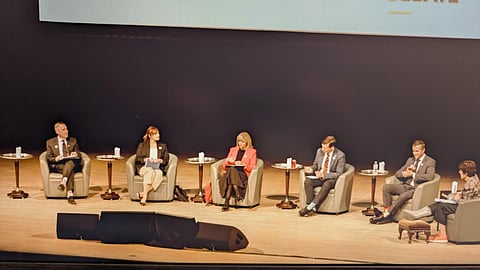

It wasn’t officially billed as the "heavyweight debate" when the five leading Calgary mayoral candidates gathered earlier this week at the Werklund Centre (formerly Art Commons) to debate and layout their platforms.
The debate was hosted by the Calgary Chamber of Commerce (the Chamber) and ably moderated by Deborah Yedlin, the Chamber’s president and CEO and sponsored by the Calgary Construction Association.
The five, Brian Thiessen, Sonya Sharp, Jyoti Gondek, Jeff Davison, and Jeromy Farkas were chosen by the Chamber based on their positioning in most recent polls as the leading candidates in Calgary’s election.
To open, each candidate was given two minutes to layout their visions for the city, followed by rounds of rebuttals. At times, the gloves came off, followed by finger-pointing, but no hard blows were landed.
Not surprisingly, all five offered platitudes, promises, pledges, and pleas for Calgarians to give them their votes.
A lot of the talk centred around safety in the city, with a focus on the downtown, with promises of higher police presence in the area.
Lots of discussion also about the city’s aging infrastructure, as well as construction delays leading to small businesses closing their doors, particularly in Marda Loop and of course, the blanket upzoning bylaw, which was approved by nine councillors last year, who gave the finger to democracy by going against the wishes of more than 75% of Calgarians who said they didn't approve.
Of the five, Sharp and Davison said, if elected, they would repeal the bylaw; Farkas said he would replace it with a new plan to put housing density in targetted areas (with no further explanation), and; Gondek and Thiessen would not repeal the bylaw if elected.
More than a very destructive piece of legislation, the approval of the bylaw is very instructive on how city council works.
There is an oversized emphasis on the mayor, perhaps because the mayor is seen as the "leader," charged with ensuring council meetings run smoothly and according to the rules. The mayor also attends more ceremonies and celebrations than other councillors, so has a much higher profile. (And a much higher salary of roughly $100,000 more than councillors.)
For these reasons, most Calgarians focus their attention on the mayoral candidates.
But Gondek did not approve the bylaw by herself; she had a group of councillors, known as the Hateful 8 as allies at the time, who voted with her on that, and other DEI/woke issues.
It takes eight votes on council to get motions, bylaws, etc, approved and the mayor’s vote doesn’t need to be one of the eight.
Calgarians need to focus on candidates running in their wards and get to know the platforms and promises of each candidate. With the introduction of municipal political parties this year, it makes it easier to ascertain councillor candidates’ platforms, ideologies, and more. These can also be determined for candidates who are not members of one of the parties by visiting websites or contacting candidates.
It’s not a lot of work; you’re only considering candidates in your ward, and it is decidedly easy to find out who those candidates are at electionscalgary.ca.
It’s never been more important to do your research than this year, because there are openings for eight new faces on council this year.
It’s an opportunity that doesn’t come along very often; an opportunity to make a big change on who sits in council chambers.
And Calgarians certainly need a change on council. Day for making that change is election day, October 20.
